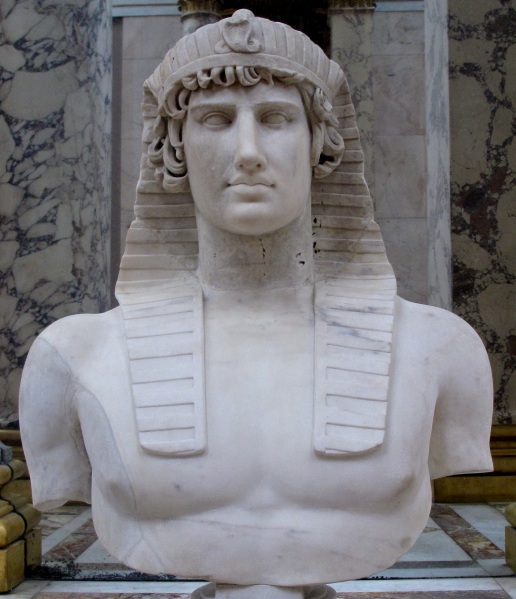A Litany for Antinous the Liberator
In the name of Antinous, the Liberator, the Savior, the Human-God, Victorious One, Emperor of Peace.
From all that oppresses us, Antinous, liberate us.
From all that inhibits us, Antinous, liberate us.
From all that constrains us, whether without or within, Antinous, liberate us.
From racism and all racial prejudice, Antinous, liberate us.
From sexism and all misogyny, Antinous, liberate us.
From disrespect for our elders, Antinous, liberate us.
From disrespect for our youth, Antinous, liberate us.
From homophobia and all hatred of sexual minorities, Antinous, liberate us.
From transphobia and all hatred of gender minorities, Antinous, liberate us.
From all contempt for women and girls and for effeminate men, Antinous, liberate us.
From all injustice, Antinous, liberate us.
From sexual violence, Antinous, liberate us.
From bullying and harassment, Antinous, liberate us.
From depression and melancholy, Antinous, liberate us.
From loneliness and despair, Antinous, liberate us.
From doubt of our own gifts, Antinous, liberate us.
From doubt of our ability to act, Antinous, liberate us.
From the wounds of the past, Antinous, liberate us.
From fear of the future, Antinous, liberate us.
From all our addictions and from contempt for the addicted, Antinous, liberate us.
From poverty and the shaming of the poor, Antinous, liberate us.
From hunger and from greed and grasping, Antinous, liberate us.
From all illness of body, mind, or soul, Antinous, liberate us.
From ignorance, especially willful ignorance, Antinous, liberate us.
From the tyranny of the wealthy and their greed, Antinous, liberate us.
From the tyranny of the bigoted and their fear, Antinous, liberate us.
From the tyranny of the lustful and their self-loathing, Antinous, liberate us.
From every kind of hatred and violence, Antinous, liberate us.
[Additional petitions may be inserted here. ]
Guard and defend us, Antinous, as we struggle to free ourselves; guard and defend us, Antinous, as we strive to liberate others; guard and defend us, Antinous, as we await the rising of your star.
Ave, ave, Antinoe!
Haec est unde vita venit!

Hymn II: To Antinous the Liberator
Many are the burdens we bear, and high are the walls
that are built around us; many are the voices we answer
to and the eyes of the judges; many are the wounds
that never healed and the old pains that catch at
the spine, and we lower our eyes to the pavement
and feel that nothing will ever change.
But you, Antinous,
have defeated all the archons, and nothing can withstand
your power. You offer your hand to all those who are bound
up in their own knots; you lift your spear in defense of all
who live under tyranny. Where there is a march for justice,
you march with them; where there is a fire for freedom,
you bear the torch. Where truth is spoken to power,
you stand beside; where the truth of a soul is opened,
you listen in witness. You are the Liberator from all
that oppresses or inhibits; you hunt down the tyrant,
strike open the locks, trample down the doors.
O liberate me, Liberator, from all that oppresses
or inhibits, that I may have the freedom of your friendship
now and forever.

Hymn IX: To Antinous-Dionysus, Liberator
As long as there’s music to dance to, he will come.
As long as there’s a bottle of wine or something else to share, he will come.
As long as lovers slip off and couple even when there’s no place or time for it,
he will come, Antinous Dionysus, Dionysus Lusios, Liberator.
As long as there’s sex, drugs, and rock’n’roll, he will come.
As long as people march in peace and break windows in fury, he will come.
As long as people sit home in the darkness, afraid to get up and step out
into the light, he will come, Antinous Dionysus, the breaker, the loosener.
He will come and break the bonds of tyranny and oppression.
He will come and loosen the knots we tie ourselves up in, inside.
He will throw open the windows and doors, turn stairs into ramps,
water into wine, sorrow into joy, depression into weeping,
tears into laughter, He will come, Antinous Dionysus, Lusios,
Liberator, deliverer, he will come, he will come, if we call:
Evohe! Evohe! Evohe!

A prayer to Antinous in this time of crisis
O Antinous, Beautiful Boy, Osirantinous, Justified One,
I cry out to you in a time of many struggles.
My nation is an empire falling to its knees and falling apart.
There is no good emperor. There is no just rule.
I cry out to you as Liberator
on behalf of the immigrants imprisoned in camps:
Set them free.
I cry out to you as Liberator
on behalf of the protestors in our streets:
March with them. Protect them.
I cry out to you as Antinous Hermes:
May the images of resistance and brutality
be spread far and wide.
May wickedness be exposed.
May police and governments be held accountable.
I cry to you as Antinous Asklepios:
We still suffer from the plague of coronavirus.
Send us healing. Protect the healers.
I cry out to you as Lover:
May these armies of lovers not fail
who love one another more than their privilege,
who love justice more than order,
who love equality more than hierarchy.
And I cry out to you as Navigator:
Show us the way forward.
Turn the wheel of the ages.
Show us how to untie the knots
of hatred, hierarchy, bigotry, privilege,
how to pull on the threads that will
unravel the whole tapestry of
-isms that covers the world
so that we may unveil the true beauty
of the world, of one another, of ourselves.









